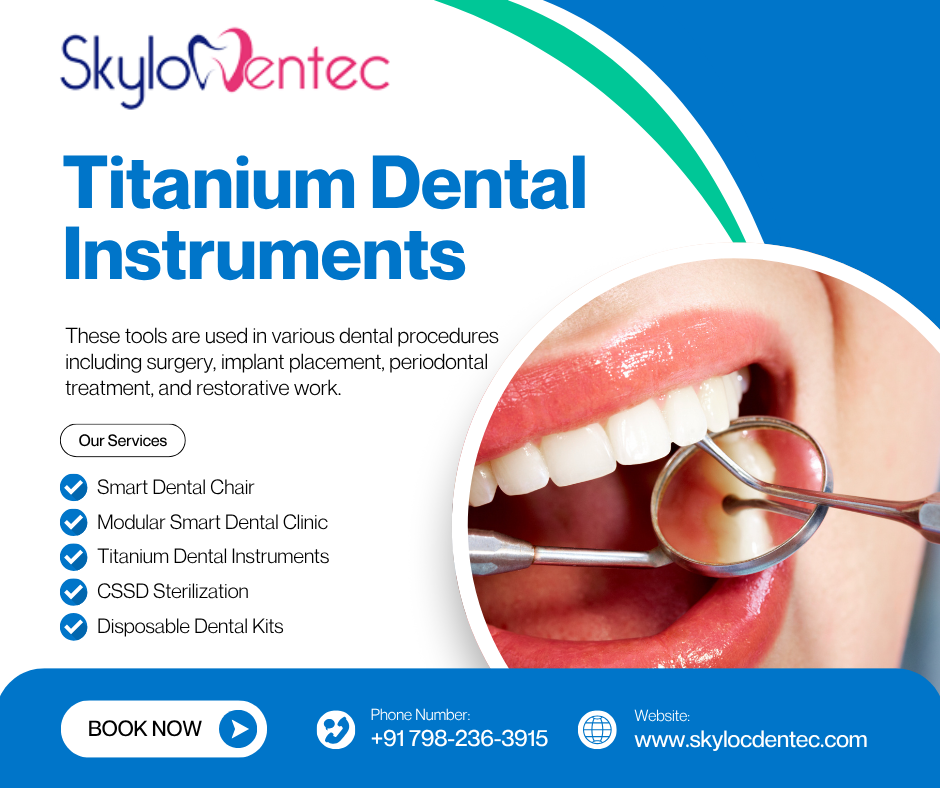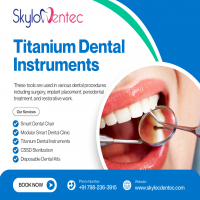Titanium Dental Instruments: Durable, Lightweight & Corrosion-Resistant

Strong 8k brings an ultra-HD IPTV experience to your living room and your pocket.
In the fast-paced world of modern dentistry, the quality of tools used by dental professionals can directly impact the success of treatments and overall patient satisfaction. Among the various materials used for manufacturing dental tools, titanium has earned a premium position due to its extraordinary properties. Titanium dental instruments are not only durable, but also lightweight and corrosion-resistant, making them a reliable choice for clinics and dental professionals worldwide. Let’s explore why titanium dental instruments are becoming a preferred choice across a wide range of dental procedures and how they enhance clinical outcomes.
What Are Titanium Dental Instruments?
Titanium dental instruments are tools made primarily from medical-grade titanium alloys. These instruments are commonly used in oral surgeries, implantology, periodontics, endodontics, and other dental specialties. From implant drivers to periodontal curettes, titanium is used to manufacture tools that require precision, strength, and biocompatibility. Unlike stainless steel or chrome-based alternatives, titanium offers a unique blend of strength, flexibility, and resilience, allowing dentists to perform treatments with better control and comfort.
Key Features That Make Titanium Dental Instruments Stand Out
1. Durability That Lasts
Durability is one of the most important features of any dental instrument. Titanium dental tools are exceptionally strong, with high resistance to mechanical wear, stress, and pressure. Even with repeated use, titanium maintains its structural integrity and cutting-edge precision. Dentists who invest in titanium instruments benefit from longer tool life, reduced breakage, and fewer replacements—making it a smart long-term investment for any clinic.
2. Lightweight for Enhanced Ergonomics
Dental professionals often perform intricate procedures that require fine motor skills and prolonged concentration. Traditional steel instruments can be heavy, leading to hand fatigue, wrist strain, and reduced precision over time. Titanium, being significantly lighter than stainless steel, offers a more ergonomic solution. Its lightweight design reduces muscle fatigue and increases control, allowing dentists to work more comfortably for longer periods. Whether you are performing endodontic treatments or placing implants, the reduced weight of titanium instruments helps in maintaining accuracy and confidence throughout the procedure.
3. Corrosion Resistance Ensures Hygiene and Longevity
Sterilization is a routine process in dental clinics. Dental instruments are exposed to autoclave temperatures, chemical disinfectants, blood, and saliva—all of which can cause corrosion over time. One of titanium’s most exceptional properties is its natural resistance to corrosion. Titanium forms a protective oxide layer on its surface, making it impervious to rust, acids, and moisture. This means titanium tools do not degrade, discolor, or weaken after repeated sterilization cycles—ensuring consistent performance and a hygienic clinical environment.
Clinical Benefits of Using Titanium Dental Instruments
1. Improved Precision and Performance
Titanium dental tools offer greater tactile sensitivity and better handling, helping dentists perform with improved precision. For example, titanium curettes and scalers allow for gentle yet effective debridement without damaging the tooth or surrounding tissues.
2. Biocompatibility and Patient Safety
Titanium is highly biocompatible, making it ideal for instruments used inside the mouth, especially for surgical procedures and implant placements. Patients are less likely to experience allergic reactions, inflammation, or tissue rejection when titanium is used. This increases post-operative comfort and healing speed.
3. Ideal for Implantology and Surgery
In procedures like implant placement or bone grafting, tools are exposed to bone and soft tissue. Titanium tools offer high resistance to contamination, do not interact negatively with the body, and can perform reliably under pressure. Titanium is also used in implants, making it a compatible choice for tools used in the same environment.
Applications of Titanium Dental Instruments
Titanium instruments are versatile and used across various dental specialties, such as:
- Implant Dentistry: For torque drivers, surgical kits, and abutment placement tools.
- Oral Surgery: Scalpels, elevators, and needle holders made from titanium offer precise cuts and reduced tissue trauma.
- Periodontics: Titanium curettes reduce scratching on titanium implants during maintenance therapy.
- Endodontics: Flexible and strong titanium files improve cleaning and shaping of root canals.
Why More Dentists Are Making the Switch
With rising awareness of ergonomic design, patient safety, and long-term investment, many dental professionals are transitioning to titanium dental instruments. These tools help streamline workflows, reduce the frequency of tool replacement, and provide better overall performance. Even though titanium tools may come with a higher upfront cost compared to stainless steel, their durability and resistance to corrosion make them more cost-effective over time.
Final Thoughts
When it comes to dental instruments, choosing the right material is not just about performance—it’s about reliability, comfort, and safety. Titanium dental instruments tick all the right boxes. They are durable enough to withstand repeated use, lightweight enough to reduce operator fatigue, and corrosion-resistant enough to ensure long-lasting performance. For dental clinics aiming to enhance their quality of care while minimizing long-term equipment costs, titanium tools are a smart, future-ready investment.
Note: IndiBlogHub features both user-submitted and editorial content. We do not verify third-party contributions. Read our Disclaimer and Privacy Policyfor details.


